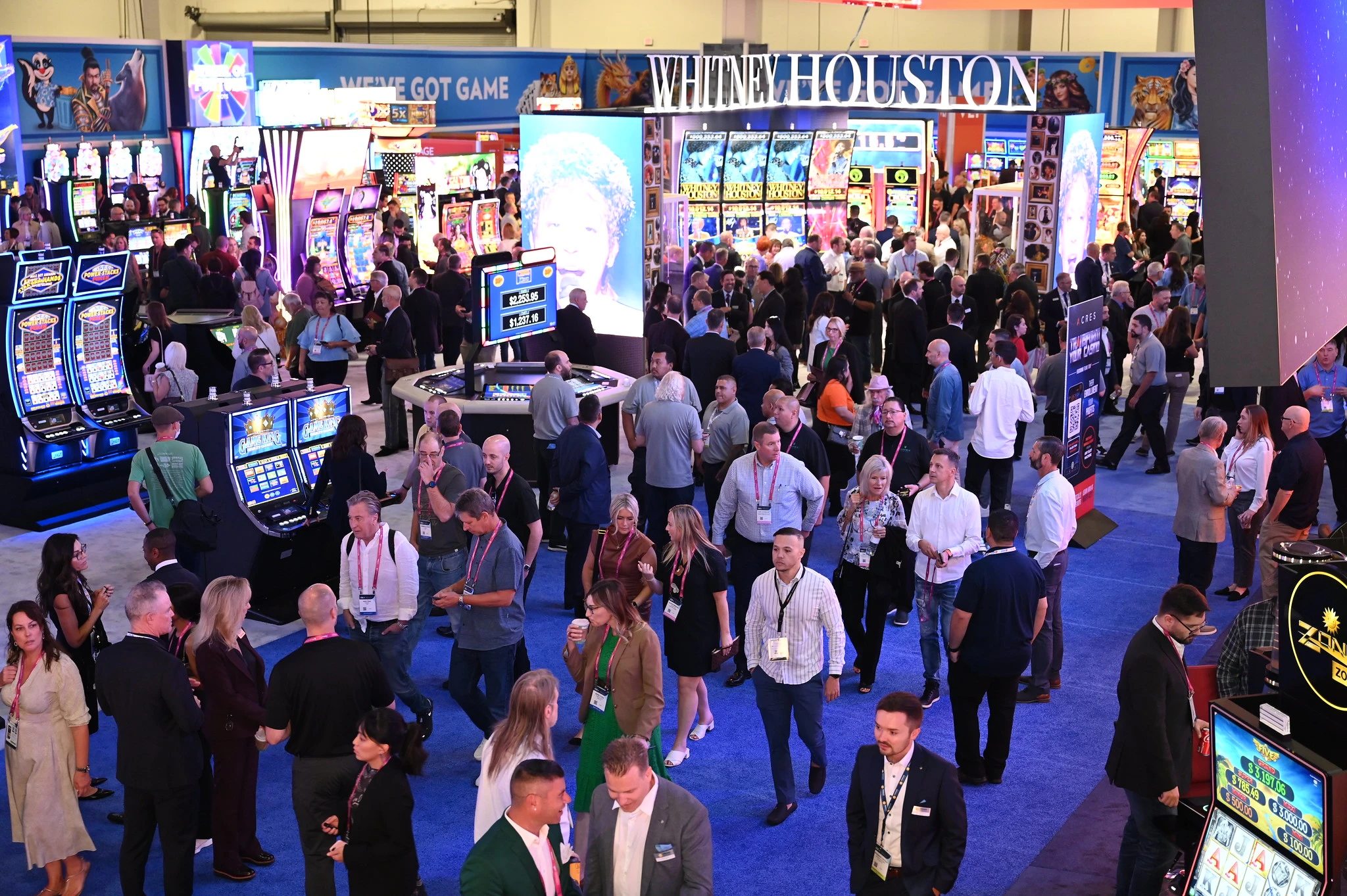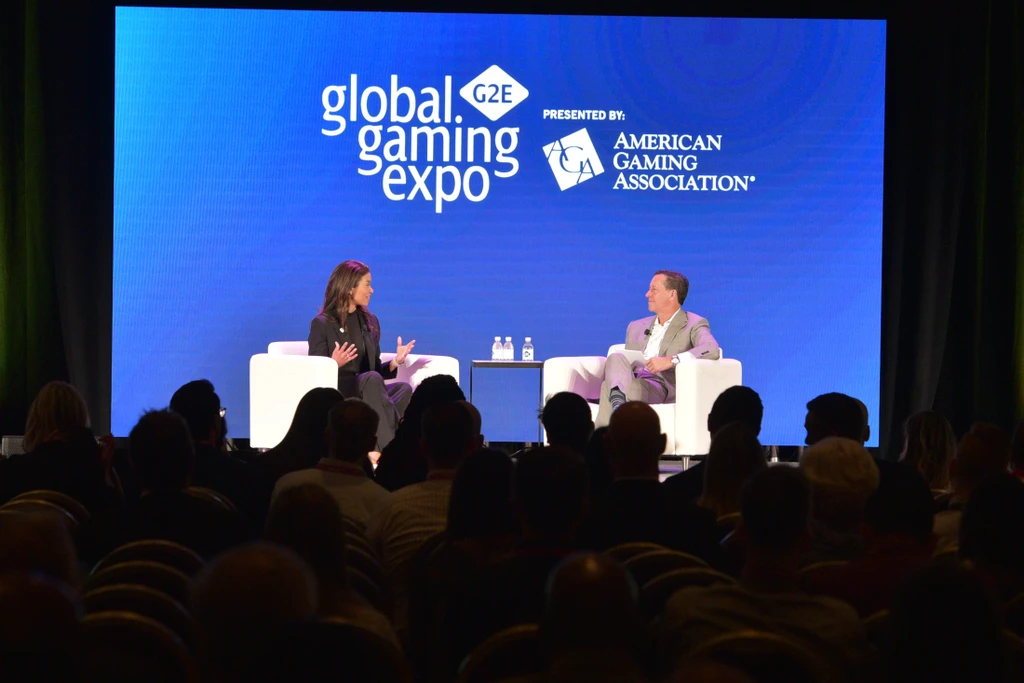G2E 2023: Like Covid never happened

It was like the pandemic never happened.
The Global Gaming Expo returned to Las Vegas last week, upbeat and optimistic about igaming’s future.
The industry faces headwinds in the coming months from the US economy and a potential Culinary Union strike in Las Vegas, but attendees at the show remained positive.
G2E attracted more than 25,000 people over its four days, just shy of 2019’s record 27,000 turnout. Attendance continued to bounce back after 2020’s cancelled event and a 2021 edition that drew only 13,000 delegates.
A greater return of international visitors and exhibitors – more than 125 countries were represented – helped boost attendance numbers. There were 368 exhibitors, up from 350 a year ago, and 128 new participating companies. In addition, there were more than 100 educational sessions covering everything from cybersecurity and cashless gaming to tribal gaming, sports betting and igaming.
Moving on from Covid
“I think this is the first time in years it was back to being a global gaming conference again,” says Oliver Lovat, CEO of the Denstone Group. “The last couple of years people have said it’s global, but it really hasn’t been that global but more North American.
“This year, everyone was back in business again. There were people from Bulgaria, the Middle East, UK, the Philippines and the rest of Asia. It was everybody back to full-speed again. We’ve moved on from Covid. They were there to do business and get things done.”
Attendees and exhibitors saw something different at this year’s G2E. The American Gaming Association created an igaming zone for the first time to showcase its growing importance to the US casino industry.

“It felt like the pandemic never happened,” says Victor Rocha, conference chairman of the Indian Gaming Association, which facilitated tribal educational sessions.
“It felt like the first true post-pandemic show for G2E, it was alive and exciting and everyone was there to do business.”
Rocha says the energy could be felt in Las Vegas and there was a real buzz in the city. Ten days before the show, U2 opened the Sphere concert venue just steps away from the Venetian Expo Center. Paving and construction projects were underway in readiness for the Las Vegas F1 Grand Prix that will make its debut on the Strip in November.
A new energy at G2E, but looming issues for Las Vegas
“It didn’t feel like the same old trade show,” he adds. “Like everything in Vegas, it felt invigorating and even when you walked around it seemed different with F1 coming up and sports teams playing during G2E.
“You can tell there’s a new energy in Las Vegas and that carried into G2E.”
Brendan Bussmann, managing partner of B Global Advisors, called it “a great show overall” and praised the industry for continuing to excel and move forward from the pandemic while adapting and innovating across all channels from land-based casinos to online.
Under the surface, however, the concerns were evident.
Members of the Culinary Union picketed in front of Strip casinos after voting in September to authorise a strike among some 38,000 non-gaming employees at Wynn Resorts, Caesars Entertainment and MGM Resorts International properties.
This would be the first citywide strike since 1984, but MGM CEO Bill Hornbuckle said during G2E that he expects a deal, avoiding disruption to both F1 and the upcoming Super Bowl in February.
“If you would have told me we are where we’re at in 2023 compared to when we didn’t have G2E in 2020 and the doldrums of 2021 and that we’re this far advanced, I would have been shocked,” Bussmann says.
“There’s still an undercurrent of what’s going on both economically and geopolitical forces that bring concern overall, but in general everyone is very optimistic about the potential for the future even if there’s a slight downturn along the way.”
Hacks create cause for concern
The casino industry is already dealing with cyberattacks from foreign hackers that shut down slots, ATMs, door keys, reservation systems and computers at MGM properties and will end up costing the company $100m. Hornbuckle called the attack “corporate terrorism at its finest” but noted MGM had enjoyed strong bookings since, thanks to the upcoming F1 and Super Bowl.
Caesars, which like MGM is facing class-action lawsuits for the breach, was hacked of personal customer data in August. There are ongoing concerns properties could be hacked again and hamper their operations.
Igaming takes centre stage at G2E 2023
The show had its shiny new objects that always grab attention. Aristocrat unveiled NFL-themed slots and the latest in artificial intelligence, cashless payments, live dealer and other technologies, including cybersecurity, was also on display. But what really stood out this year was the special emphasis on igaming.
“Igaming is one of the industry’s most prominent growth sectors both in the US and abroad,” G2E executive vice-president Korbi Carrison explains. “As such, we determined it was important to highlight innovation in the vertical by bringing together igaming solution providers in a focused location. It was a hit.
“Exhibitors built top-tier booths showcasing an array of dynamic new products and attendees showed their excitement by packing the space throughout the week.”
According to Bussmann, highlighting igaming as an emerging part of the US gaming industry added value to the show floor.
Only Michigan, New Jersey, Pennsylvania, Delaware, West Virginia and Connecticut offer igaming and Rhode Island will soon follow. Nevada offers online poker only.
“While it has not gone at the pace you’ve seen in the US with sports betting, it’s a growth opportunity for the industry,” Bussmann explains. “[They have] an ability to continually bring in new customers and give those existing customers an added benefit of how they can interact with one of the best forms of entertainment in the world.”
The positive impact of Covid
Steve Cvetkoski, vice-president of product for Galaxy Gaming, reckons this year’s G2E was one of the busiest shows. It has been building every year since the pandemic.
“The enthusiasm has been as high as ever,” Cvetkoski says. “There’s been a lot of meetings and a lot of people interested in new games and products. People are open to look at fresh new things and how they can upgrade their floor.
“You hear different things about [people worrying about] the economy but you wouldn’t know it being here. It’s been a great show for us.”
It was exciting to see the focus on igaming this year and Cvetkoski expects that section to take up more space in the future. Trade shows such as ICE in London are more igaming-heavy, but it’s a welcome addition at G2E, he adds.
“We’re big into igaming,” Cvetkoski explains. “We license the majority of our most popular products on igaming as well and it’s the wave of the future we all saw coming.
“Covid brought on the advancement of igaming even quicker because you can do it from anywhere and that will continue to grow.”
Asia makes its presence felt at G2E
This year’s show also saw the continued return of Asian companies, most of which offer peripheral gaming products and equipment manufacturing.
These businesses are exploring avenues to tap into the US market. Some already have clients in Latin America and use G2E Las Vegas as a platform to meet old clients, according to C3 Gaming principal Lawrence Shen.
“The percentage of tech companies exhibiting at the show continues to rise, ranging from payment technology to gaming data intelligence, from anti-fraud practices to food and beverage services,” Shen explains. “There are also more casinos shopping for those services every year.”
Recent events push cybersecurity up G2E agenda
Julia Carcamo, president of New Orleans-based marketing agency J Carcamo & Associates, saw operators looking at new technology and spoke to casinos specifically looking at cybersecurity given recent hacks.
“Marketers were also looking at digital marketing tools as a way to start communicating more digitally than we have in the past,” Carcamo says. “And this whole blending of igaming and sports betting and what we normally know as traditional gaming was really exciting.”
However, Oliver Lovat was sceptical about the level of innovation from the industry over the past year. He did single out payment processing technology and loyalty management as particular highlights and thought more could come as a result of the igaming zone.
“In Europe, the igaming space has been a lot stronger than in the US for as long as I can remember, but it does seem like the US is advancing on the igaming train. I think it’s because regulation is changing and customers are much more open to it.”
Where is US igaming heading?
Educational sessions dealt with the growing significance of igaming and where it’s headed in the US.
Raf Mercado, vice-president of the investment banking division at Goldman Sachs, told the conference that digital offerings will be an extension of what gaming companies do. These won’t be a disruptive influence and they will not cannibalise revenue; instead they’ll help attract more people.
“The folks that bet on sports and online casinos in New Jersey or Midwest are adding on to the gaming spend and not taking away from their trip to Vegas as people like to think,” Mercado says.
The general consensus suggests igaming won’t expand in the US until states face budget shortfalls in the future. Many are flush with cash following federal government bailouts from a loss of revenue during the pandemic.
Howard Wang, managing director at Ares Management, believes politicians, however, will continue to be leery of its expansion.
“If you are the government of a state that has traditional brick-and-mortar casinos and you’re not quite sure and not that confident it will grow the pie, and you’re afraid of the cannibalisation of existing tax revenue and jobs lost, you are going to be very cautious in passing legislation,” Wang explains.
“I think that’s the case with most states that operate commercial casinos. Even though I believe igaming is the biggest growth opportunity for the industry, I think it will be very slow.”
AGA’s Bill Miller bullish on industry prospects
AGA president and CEO Bill Miller painted a positive picture for the gaming industry going forward despite headwinds such as recession, high interest rates and increased cost of capital and inflation.
The popularity of casino gaming is shown in how Americans spend their entertainment dollars. Gambling recently hit an all-time high, with 49% saying they played some form of real-money game in 2022, Miller pointed out.
Record levels of support for gaming and a focus on responsible gaming has helped pave the way for expansion, with 12 new brick-and-mortar casinos opening since G2E 2022, Miller added. That takes the total number of casinos in the US past 1,000 for the first time.
And 2023 also marks five years since the Supreme Court overturned PASPA, the federal law that limited single-wager sports betting to Nevada. Today, 35 states offer regulated sports betting and three more are coming online soon. Igaming is up more than 20% compared to last year.
Gaming is expanding around the world. MGM is closing its deal to build Japan’s first gaming resort by the end of the decade. The Mohegan Sun tribe of Connecticut will open an integrated resort in Korea. Brazil is moving towards legalisation at long last. Then there’s Wynn building a casino resort in the United Arab Emirates.
“Needless to say, we are riding a big wave of expansion both here at home and in markets that had long been closed to our industry,” Miller said at G2E.
A blueprint made in the US
As for why that’s happening, Miller said the American gaming industry has designed a successful blueprint. It’s an approach that creates a sustainable, thriving business, drives growth, delivers meaningful impact in communities and has earned broad support among consumers, legislators and regulators.
“This blueprint is American made – and it’s being embraced all over the world,” Miller said.
The blueprint was invented on the Las Vegas Strip where customers get the most innovative and immersive entertainment in the world, he added. Stage performers, top restaurants, world-class hotels and spas and existing gaming experiences are all under one roof.
“It’s the concept that turned 110 acres of desert into one of the top tourist destinations in the world. From Singapore to Macau and from Massachusetts to Maryland, the integrated resort model is working. And now, it’s driving gaming’s expansion to places like Japan, Korea and the UAE.”
Photo credit: Global Gaming Expo

Buck Wargo is a Las Vegas-based business and gaming journalist. He’s a former reporter for the Los Angeles Times. He has a degree in Middle Eastern Studies from the University of Texas and worked as a foreign correspondent in the Middle East.
